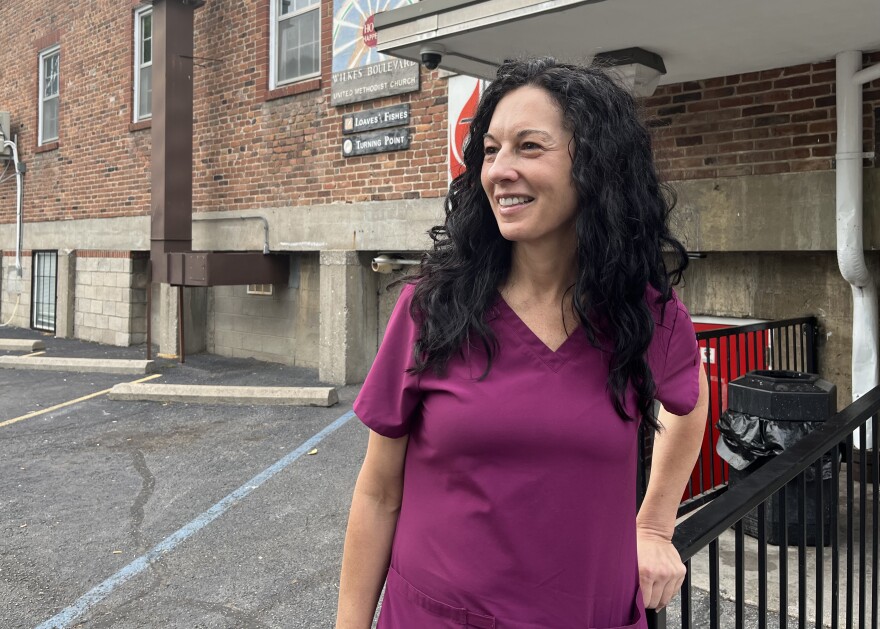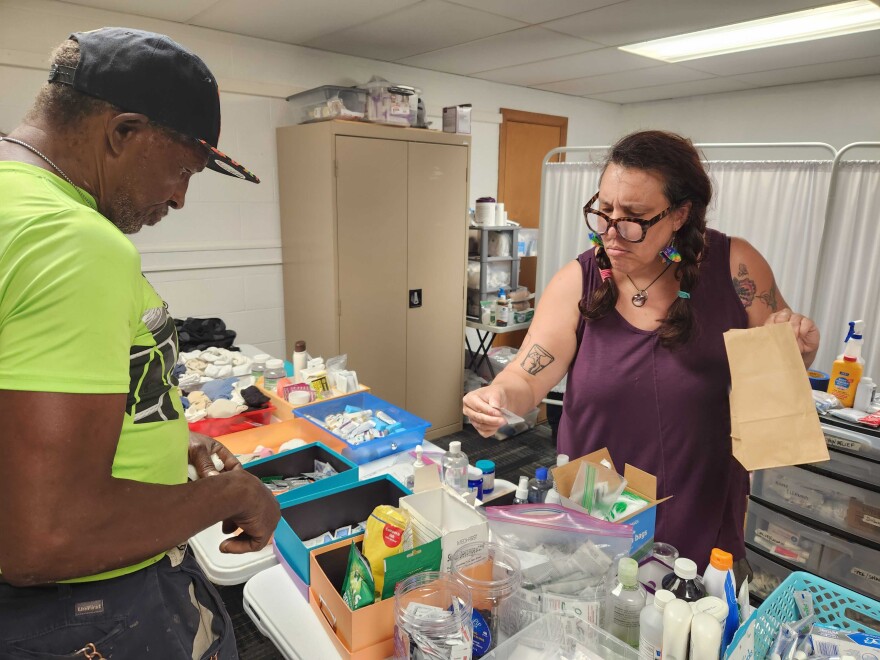Holding up a tick-removal tool the size of a dental floss pick, Cat Armbrust described it as “fantastic.”
“They’re really inexpensive so we can just hand them out like candy,” she said.
Armbrust, the director of the CoMo Mobile Aid Collective, said that tick season has hit hard for Columbia’s homeless community this summer. The group has been seeking donations for bug repellant and tools to safely remove ticks.
During one of the group’s recent med clinics, which are held twice weekly at Wilkes Boulevard United Methodist Church, Armbrust handed out maximum strength anti-itch cream and asked a man if he had any bug bites. He did.
Another person at the clinic, Marlene “Smiley” Godwin, came to the med clinic in June with tick bites on both of her hips and underarms. She had been awaiting the results of a Lyme disease test, excited to diagnose her chronic pain.
“I’ve already had 30 bites,” Godwin said. “See all these, little, right here — all tick bites.”
As she spoke, Godwin noticed a tick on her dog, Charlie. “I just picked it off her. It’s one of them Lone Stars.”

Godwin first came to the clinic in September 2022 and told nurse Gayle Link about the serious chronic pain she’s experienced for more than a decade. She says Link was the first medical professional to take her issues seriously.
In the months since they met, Link and Godwin have wondered if her chronic pain had been the product of tick-borne illness. Godwin’s symptoms include neuropathy, swelling and intense pain in her joints. Link quickly connected her symptoms to chronic Lyme disease.
“It’s a little overwhelming seeing how many tick bites and rashes and symptoms that people have,” Link said.

Link, a registered nurse who began the med clinic, hears near daily reports of ticks or tick-related symptoms from people experiencing homelessness. This spring and summer, she and the other health care professionals who staff the clinic have been removing ticks and connecting people with symptoms to medical care.
Link lists common symptoms of tick-borne illness as flu-like symptoms, inflammation and pain in the joints, night sweats and high fever.
“The first thing I think about is, ‘Have they had recent tick bites?’” Link said. “Most of them had several.”
Armbrust said recent evictions from encampments have probably played a role in worsening exposure to ticks. She said many of the encampments had been around for years, and packed down brush made the spaces less hospitable to ticks. As people find new spaces to camp with higher grass and more brush, they find more ticks.
Since Bill Tolson’s camp was disbanded earlier this year, he and his dog, Mercury, have been finding new spots to sleep.
“I tried to wipe down as much weeds as I can around my camp. I even have dug down to the dirt to keep them away from me,” Tolson said. “But you got to come in and out.
“Unless you can hibernate in your tent for the rest of your life and keep your bug spray inside, there’s really not much you can do because they’re gonna be there. They’re just ferocious this year.”

Ticks and tick-borne illnesses are a major problem in Missouri. Diseases like Ehrlichiosis, Rocky Mountain Spotted Fever and Tularemia are some of the most common.
According to the Centers for Disease Control and Prevention, Missouri is actually in the top five for cases of both Ehrlichiosis and Rocky Mountain. These diseases all tend to begin the same — with flu-like symptoms — but without quick treatment with the antibiotic doxycycline, they can become quite serious and even turn deadly.
Link said the barriers to health care for people experiencing homelessness make these illnesses even higher risk for the community. She says things like transportation, costs, negative past experiences with medical providers and the fear of judgment can keep homeless people from seeking care — especially in those critical early days once symptoms begin.

Molly Baker, the vector-borne disease surveillance coordinator for Missouri, said most tick-borne diseases in Missouri are short term, but that doesn’t mean they aren’t serious.
“A significant portion of our cases are hospitalized every year,” Baker said. “So, that can present a significant burden for those individuals. It’s, you know, not only a cost to their health, but also financially as well.”
There can also be long-term complications from not seeking out care in a timely manner. Godwin’s first test came back negative, but tests for chronic Lyme disease can be unreliable, and extensive testing might be needed to get an official diagnosis.
Godwin is one of many people with chronic illnesses that Link works with through the aid collective.
In addition to addressing things like hygiene and wound care through the clinic, Link coordinates doctors’ appointments for people experiencing homelessness and accompanies them as an advocate. She has seen patients receive care with dignity and she’s seen them dismissed and talked down to in medical settings.
Link said she has chronic Lyme disease herself and understands the stigma and barriers that come with chronic illness. She said it has informed her approach to nursing.
“I understand when you have symptoms, and you go to the doctor, and they don’t — either they don’t believe you, or they think that you need to see a psychiatrist,” she said.
“I think it has helped me think about disease and chronic illness and pain in a different light and have a lot more empathy.”
This piece was reported by KBIA's Rebecca Smith and the Columbia Missourian's Hope Davis.






